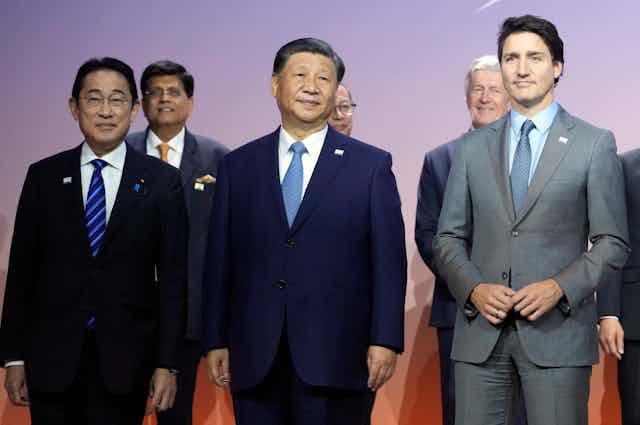Like many nations, China’s relationship to the rules-based international order has often featured a selective adherence to those rules and a focus on its own interests, sometimes resulting in violating international laws when they’re at odds with Chinese goals.
But China has the ability and opportunity to transform into a law-abiding member of the rules-based international system, which is founded on relationships among states and through international institutions and frameworks, with shared rules and agreements on behaviour.
The international community can support this transformation by engaging China on global human rights and avoiding what the Chinese government considers interference in internal and territorial affairs.
It’s important that China, now a formidable power, embraces the rules-based order to achieve international harmony, strengthen international relations and tackle universal crises like climate change. China has criticized the current international order for failing to address the development gap and promoting alliance-based confrontation, preventing peaceful international relations.
It has proposed replacing the current international order with what it calls “a global community of shared future,” suggesting the current international order isn’t fit to deal with global crises.
Revising the existing order
But the Chinese proposal doesn’t genuinely present an alternative vision that can potentially reform the existing order. Chinese authorities have complex views on international order; they don’t want to dramatically change the existing order because it’s supported China’s transition to a position of global power.
Instead, China wants to revise the existing order by increasing the role of individual nation-states and ensuring human rights standards align with unique national sovereignty priorities.
The Chinese stance provides a window of opportunity for the international community to include China in the international order, transforming it into a law-abiding member by deploying a human rights approach that temporarily prioritizes some rights over others.
If the international community continues to focus on ethnic and Indigenous rights, it’s likely to further alienate China and cause it to disengage from the international order.
Indigenous rights, which extend beyond individual rights, require providing legislative, executive and judicial powers and allowing ethnic minorities to freely pursue their economic, social, cultural and political developments. China claims that it has already provided its minorities with regional autonomy, and argues western demands that it provide additional freedoms is motivated by an interest to erode its territorial interests.
Tibet independence
In response to Tibet’s demand for autonomy, for example, the Chinese government has said Tibetans want independence and nothing else. This suggests the Chinese government considers any focus on Indigenous and ethnic rights as aimed at bringing about territorial disintegration.
That’s why China has often warned the international community not to interfere in its internal affairs and territorial disputes under the pretext of advocating for human rights.
While some western countries consider sovereignty to be contingent upon a state’s behaviour, the Chinese government considers sovereignty an absolute, non-negotiable right. Due to this conceptual gap, it is almost impossible to engage China in the area of Indigenous and ethnic rights.

Universal human rights
Focusing on universal human rights, however, would allow the international community to negotiate with China and further encourage it to become a law-abiding member of the rules-based international order.
Universal rights are more about individual rights and less about sovereignty rights. China is more comfortable with this approach. It’s issued white papers expressing its commitment to human rights and fundamental freedoms both nationally and globally.
Even though its record on individual rights is problematic in many instances — the United Nations and other organizations continue to document serious Chinese human rights abuses — universal human rights still remain an area where China is willing to engage and could provide a window of opportunity towards further progress in the future.
China has participated in global human rights mechanisms and is trying to promote itself as a good international citizen that respects human rights.

Ethnic rights advocacy abroad
China consistently supports ethnic rights outside its national borders. It has adopted the UN Declaration on the Rights of Indigenous Peoples, for example. A focus on universal rights when engaging with China therefore aligns with its approach on advocating for global human rights.
It has chastised some western countries, including Canada, about their own human rights abuses against Indigenous Peoples.
Inside China, ethnic minorities like Tibetans and Uyghurs have sought international support, largely unsuccessfully — the European Union’s response to the Tibetans’ demand is its notable example. Despite passing resolutions on Tibetan autonomy and self-determination, the EU has not made Tibetan nationalism part of its human rights agenda.
In the absence of international support, ethnic minorities have adjusted their demands; Tibet’s demand for ethnic rights within a human rights framework is evidence of this. Tibetans are now urging China to recognize their human rights instead of focusing solely on their demand for self-determination.
If the international community eases up for now on Indigenous and ethnic rights within China, it may be able to incentivize China to play by the rules internationally on all fronts.

